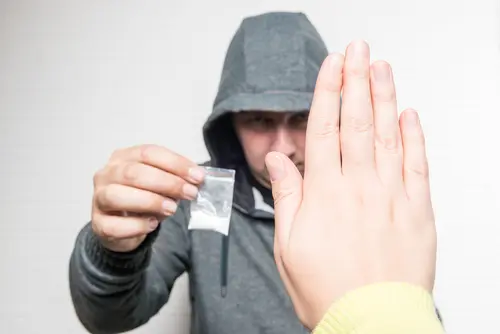How To Kick Cocaine Addiction For Good

Cocaine can be a powerful and very addictive drug. When you snort cocaine or smoke crack-cocaine, you feel the effects very quickly, but they also wear off quickly. Users experience strong cravings, and they may make rash decisions to support their habit.
If you are abusing this drug, you need to stop. There are many different cocaine treatment options that can help you. Check out these tips to learn how to kick cocaine addiction for good.
1. Be Ready for Withdrawal Symptoms
When you quit using cocaine, you may experience withdrawal symptoms. Some of these symptoms occur right away, even if you’ve just taken the drug once. They include: strong cravings, anxiety, paranoia, and agitation. You may also feel tired, depressed, and moody.
Some people struggle with sleep, can’t concentrate, or lose their enthusiasm for life. In rare cases, people have delusions or hallucinations. When you quit, make a plan to deal with your withdrawal symptoms.
Cocaine does not always cause withdrawal symptoms. If you quit and don’t experience withdrawal, that does not mean you are not addicted. You can abuse this drug, without becoming physically dependent.
2. Enroll in Rehab
If you want to quit cocaine for good, you should enroll in rehab. The most effective cocaine treatment option is inpatient rehab. Research shows that treatment needs to last at least 90 days to be effective. Ideally, you should plan to commit to rehab for as long as possible.
Many people think that they cannot stop their lives for inpatient treatment. But if you don’t give yourself time to focus on your addiction, you may continue to abuse this drug. You risk losing friends and family, watching your career suffer, or dealing with health effects. People who don’t get help may overdose and die.
If you truly cannot go to inpatient treatment, find another way to get help. You may want to consider a partial hospitalization program where you access services for several hours a day, but go home at night. Alternatively, you may want to look at other outpatient services.
3. Continue Treatment After Rehab
Sobriety is a lifelong journey. After you leave inpatient rehab, you need to continue your treatment. Consider going to counseling, joining a support group, or exploring other cocaine treatment options.
You may also have to make other changes in your life. For example, if your job or social group encourages your addiction, you may need to find a new job or different friends.
4. Address Co-Occurring Disorders
Cocaine abuse does not happen in a vacuum. Many people with substance abuse disorders also struggle with other issues. Over one third of people who are addicted to drugs and alcohol also have mental health disorders.
Depression, anxiety, PTSD or other mental health issues can drive your addiction. You may turn to this drug to mask the symptoms of these disorders. To get past your addiction, you also need to treat these issues.
5. Think About Triggers
To avoid relapse, you should think about your triggers. A trigger is a feeling or a situation that makes you want to do cocaine. Some of the most common triggers include stress, boredom, or challenging emotions. Often, people experience a trigger when they’re around certain people or see someone else doing cocaine.
Get to know your triggers and learn how to deal with them. In some cases, you may need to change your environment. For instance, you should not hang around with people who use cocaine while you are trying to stay sober. In other cases, you need to find alternative ways to deal with triggers.
6. Explore Healthy Coping Mechanisms
As you quit cocaine for good, you need to learn healthy coping mechanisms. For instance, if you use cocaine to boost your confidence, you need to find other ways to quiet your inner critic and improve your self esteem. If you turn to this drug when you’re stressed, you need to work on stress-reduction techniques. Your counselor can help.
7. Find Your Joy
Cocaine increases the levels of dopamine in your brain. When you have a lot of dopamine, you feel happy and euphoric. Eventually, you have to take more and more of this drug to feel the same effects, which is why cocaine is so addictive.
If you want to quit cocaine for good, you need to find joy in other places. If you like a rush, you may want to look at hobbies that boost your adrenaline like rock climbing or mountain biking. Even just eating right and exercising can help to improve your mood and increase your dopamine levels.
To learn about cocaine treatment options, contact Springhill Recovery Center. We offer quality treatment for an effective recovery. Call us today, we’ll answer your questions and help you take the first step toward quitting cocaine for good.
- Cocaine withdrawal: MedlinePlus medical encyclopedia. https://medlineplus.gov/ency/article/000947.htm
- 10 best ways to increase dopamine levels naturally. https://www.healthline.com/nutrition/how-to-increase-dopamine
- How to manage triggers and prevent a relapse. https://www.verywellmind.com/why-did-i-relapse-21900
- How does cocaine produce its effects? https://www.drugabuse.gov/publications/research-reports/cocaine/how-does-cocaine-produce-its-effects
- How long does drug addiction treatment usually last? https://www.drugabuse.gov/publications/principles-drug-addiction-treatment-research-based-guide-third-edition/frequently-asked-questions/how-long-does-drug-addiction-treatment-usually-last
- NIMH » substance use and mental health. https://www.nimh.nih.gov/health/topics/substance-use-and-mental-health/index.shtml


